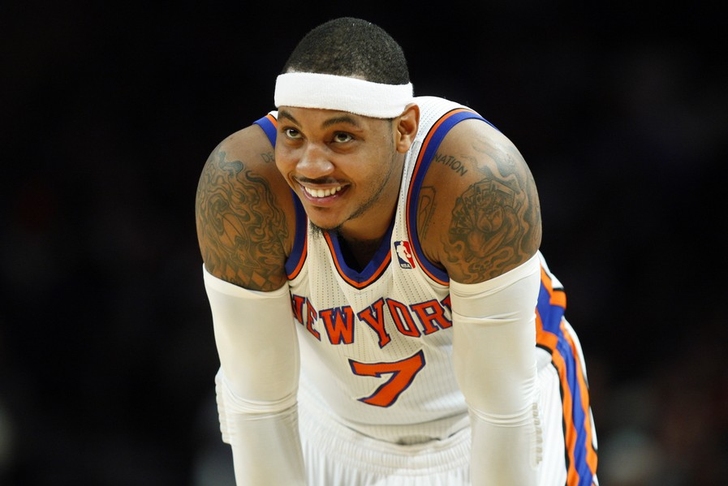Uncanny scoring prowess, late-game heroics and New York swagger embody Carmelo Anthony’s game. His tenure during the New York Knicks’ return to prominence has been impressive even without a Finals appearance. Under Anthony’s watch, the Knicks have won their first division title since 1994, along with their first postseason series since 2000. Anthony has provided the consistency you'd expect from any franchise player—his ability to drop 30 points on any given night, coupled with bold shot selection, has given Madison Square Garden the most optimism it's had since the days of Patrick Ewing. Without Anthony, the Knicks are a lottery team; with him, they’re among the Eastern Conference elite.
With the 2013-14 season looming, Anthony faces new challenges. No longer are the Knicks a league-wide surprise, as they’re expected to (at least) duplicate last season’s success. Division banners make great decorations, but championship-starved cities prefer rings and bragging rights. Experiencing the second round for the first time in a decade is a relief, until you fear it’s your ceiling.
Unfortunately, Anthony has celebrated division titles and first round advances only twice in his career. As a result, greater things are expected from the reigning NBA scoring champion. He won’t be measured against what the Knicks haven’t achieved in over a decade, but against what LeBron James and Kevin Durant, among others, are currently doing. Narrative no longer takes precedence over inevitable championship expectations; championship expectations have arrived, and Anthony knows it.
With free agency nine months away, Anthony’s performances this season take on special importance. How he produces and leads the Knicks will dictate the reception of his inevitable max-deal next summer. Another early postseason exit will be accompanied by cringes and suggestions the Knicks are (again) pursuing championships with the wrong navigator. On the other hand, a deep postseason run – ending in an Eastern Conference Finals appearance, at least – could breed great optimism, as the Knicks will believe they've finally found their championship building block.
Before Anthony, the Knicks learned the hard way not to give max-level salaries to less-than-max-level performers. Allan Houston and Amare Stoudemire – currently Anthony’s teammate – both signed $100 million contracts to lead the Knicks to prominence, and both eventually fell short. Of course, their shortcomings only became apparent after their bodies betrayed them, but the disappointment hurts all the same.
By signing a max contract, Anthony accepts responsibility for making that disappointment disappear. He’ll accept the fact that first and second round exits won’t suffice for a franchise championship-starved since 1972, and he’ll accept the fact that he must grow into more than an elite scorer.
This growth – or at least the observation of it – should begin before Anthony puts pen to paper. Oddly enough, he enters the season poised for a max contract without a very impressive resume, meaning he has the most to prove. His divorce from the Nuggets was unpleasant, and now his honeymoon period with the Knicks is over. Each shot he attempts takes new importance, because the wrong miss could bite his now-expected-to-contend team in the worst place. His one-dimensional dominance must develop into a multi-faceted game.
Though an unmatched scoring talent, Anthony has never finished top-25 in rebounds, assists, double-doubles, blocks, field-goal efficiency or free throw percentage. Regarded as a superstar, Anthony has limited versatility, at least compared to his elite contemporaries. His teams have advanced to only one Conference Finals, and that was over five years ago.
Fortunately, new seasons breed new optimism, and Anthony is poised to appease. The Knicks’ only true superiors reside in Miami. There are more formidable defenses (Indiana, Chicago), flashier rosters (Brooklyn) and more exciting, up-and-coming teams (Cleveland), but the Knicks’ three-point shooting, scoring propensity and matchup advantages are respective strengths, too. Anthony experienced great success as a power forward last season, though he struggled defensively. His quick first step, deadly pull-up jumper and scoring acumen led to 54 wins, a more-than-attainable total for this season.
Still, Anthony knows regular season success pacifies only so much, especially without real postseason success. He’s grown too familiar with playoff misfortune to settle for shortened runs, no matter how adamantly he says he won’t place championship pressure on his teammates. If you're unable to spearhead a serious playoff run, you won't be considered a superstar much longer, as Gilbert Arenas and Joe Johnson found out the hard way. Neither player ever developed into the championship building block their max-deals suggested they were.
To truly represent the Knicks’ revival, Anthony must deliver more than scoring titles. There are too many variables in a given season to have a championship-or-bust mentality, but history is only so kind to players who can't bring home titles. We're willing to settle for classic performances like Reggie Miller’s eight points in 8.9 seconds and Dominique Wilkins’ Game 7 duel with Larry Bird, but neither Hall of Famer ever won a championship. That doesn’t lessen the magnitude of their efforts, just as Anthony retiring ringless wouldn’t, but perennial first round exits would dim Anthony’s New York spotlight, and he still hasn't had a moment like Miller or Wilkins to distract fans from his shortcomings.
That’s the beauty of a new season—the great optimism, promise and opportunity they provide. Slates are wiped clean; everyone is on a level playing field. Anthony enters this season poised to return the Knicks to unfamiliar glory, but it’s when his season ends that will matter most.
Back to the New York Knicks Newsfeed
